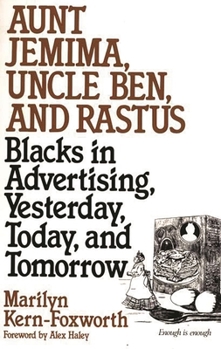Aunt Jemima, Uncle Ben, and Rastus: Blacks in Advertising, Yesterday, Today, and Tomorrow
Select Format
Select Condition 
Book Overview
This book provides a mirror to our past--a past that has been ignored or overshadowed for too long. From the foreword by Alex Haley
Format:Paperback
Language:English
ISBN:0275951847
ISBN13:9780275951849
Release Date:November 1994
Publisher:Praeger
Length:256 Pages
Weight:0.92 lbs.
Dimensions:0.7" x 6.0" x 9.2"
Related Subjects
Accounting Accounting & Finance Advertising Business Business & Finance Business & Investing Communication Communication & Journalism Communication & Media Studies Communications Economics Language Arts Marketing Marketing & Sales Media Studies Modern (16th-21st Centuries) Politics & Social Sciences Social Science Social Sciences Textbooks Words, Language & GrammarCustomer Reviews
2 ratings
thread in the rug
Published by Thriftbooks.com User , 14 years ago
great job! research of this nature is very difficult to gather.this book to me is- a basic cross section of the history of this country. images like the ones in this book help to calm, comfort & remind consummers of "Days Gone Bye". sadly these are but a few articals {as negative as most of them are presented}that show blacks in any capacity.more poeples should know the history behind their kitchen cabinets.some of these companies should be ashamed of their logos history.I wonder how many people of color hold top level positions in these companies.
Badly needed commentary
Published by Thriftbooks.com User , 21 years ago
After the civil war, (segregation notwithstanding) African Americans were technically free people, yet were featured in service products essentially recreating slavery. African Americans were only allowed a public acceptance if they conformed to stereotypical images produced by the larger (predominantely white) society. Kern-Foxworth's tome provides an eloquent examination of this double bind through brand origins to their modern day counterparts. Early depictions of Aunt Jemima reveal a gross caricturization of Black women's physical features and alleged mannerisms that can never be mistaken for flattery, yet this image was welcomed into many facilities where a living African American irrespective of title would never had been welcome. Critics of this meticulously researched, spell-binding work could argue the presence of African Americans featured on foodstuffs could be a paean to black visibility via capitalism (where purchasing popularity becomes linked to empowerment/) but the argument would conveniently neglect the undeniably problematic implications of linking African American service and purchase. Not even a transformation from turbaned servant to the vague "modern woman" has completely resolved very serious cultural contradictions and dilemmas surrounding Aunt Jemima. Is she a tool of the dominant society, a covert agent for revolutionary change or somewhere in between? Through art deconstructing and explore cultural politics, she is positioned as an uneasy reminder of America's less than admirable history of discrimination and bigotry. Reading this book is tough, but critical for everybody interested in political change and pop culture. Advertising imagery is not inanimate, instead both reflecting and shaping the nation. Encouraging critically thought about the political undertones of pop culture, the author by extension makes profound contributions to civil rights public policy.




